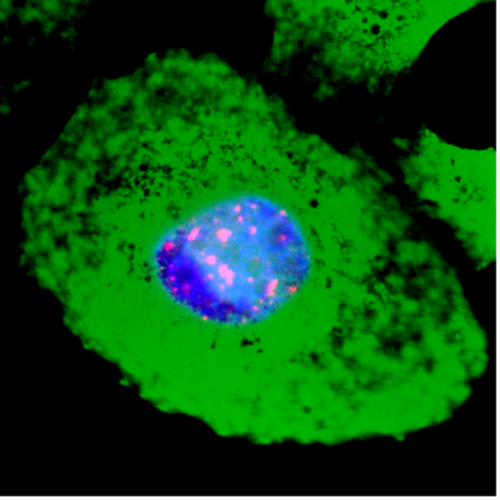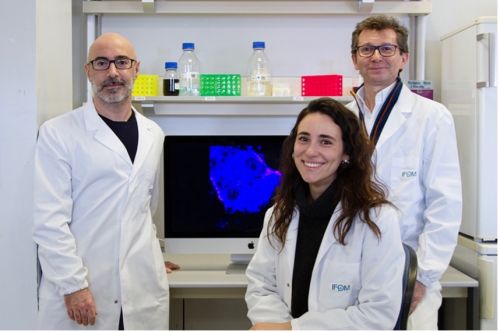- Gioia U, Tavella S, Martínez-Orellana P, Cicio G, Colliva A, Ceccon M, Cabrini M, Henriques AC, Fumagalli V, Paldino A, Presot E, Rajasekharan S, Iacomino N, Pisati F, Matti V, Sepe S, Conte MI, Barozzi S, Lavagnino Z, Carletti T, Volpe MC, Cavalcante P, Iannacone M, Rampazzo C, Bussani R, Tripodo C, Zacchigna S, Marcello A, d'Adda di Fagagna F. SARS-CoV-2 infection induces DNA damage, through CHK1 degradation and impaired 53BP1 recruitment, and cellular senescence. Nat Cell Biol. 2023 Mar 9. doi: 10.1038/s41556-023-01096-x. Epub ahead of print. PMID: 36894671.
SARS-CoV-2 damages the DNA and ages cells
Researchers identified the molecular basis of the aggressive effects of SARS-CoV-2: the virus damages cells' DNA and prevents its repair, causing further effects.
How does SARS-CoV-2 hacks cells?
Since December 2019 several advances have been made in terms of diagnosis, treatment and prevention. Yet, it is still unclear why SARS-CoV-2 has such a severe impact on human health compared to other respiratory viruses. The IFOM group led by Fabrizio d'Adda di Fagagna has specialised for 20 years in the study of DNA damage response, a fundamental process through which the cells of our body protect us from the deleterious effects of various physiological and pathological processes, including tumours and viral infections. This group has discovered one of the reasons that make this virus particularly aggressive, and the results have been published in the scientific journal Nature Cell Biology.
"All viruses, are parasites," explains Fabrizio d'Adda di Fagagna, head of the IFOM laboratory 'DNA Damage Response and Cellular Senescence' and Research Director at CNR-Igm in Pavia. "They enter a cell and start exploiting everything available to the infected cell to replicate and spread. And SARS-CoV-2 is a particularly greedy and skilful virus. In our laboratory, we wondered how this 'hacking' by the virus takes place and whether there might be a connection with those processes that we study every day in pathological fields that are only apparently distant from each other, such as tumours, genetic diseases and conditions related to ageing: all events that have in common the accumulation of DNA damage".
SARS-CoV-2 damages DNA and inhibits its repair
Starting from this premise, the study's main authors, IFOM researchers Ubaldo Gioia and Sara Tavella, identified, through the use of different in vitro cell systems, the molecular causes underlying the damaging effects of the virus, and confirmed this in vivo, both in murine model systems of infection and in post-mortem tissues derived from COVID-19 patients.
"What we have observed," Gioia and Tavella illustrate, "is that SARS-CoV-2, once it has entered the cell, hijacks its fundamental processes, forcing it to stop producing deoxynucleotides, the 'building blocks' of DNA, in order to make it produce ribonucleotides, i.e. the 'building blocks' that are used to synthesise the cell's RNA and, above all, that of the virus. It is precisely this alteration of the cellular process by the virus to its own advantage that allows the explosive viral replication within the SARS-CoV-2 infected cell'.
Blue: nuclear DNA; Red: DNA damage marker; Green: SARS-CoV-2 protein
A dramatic consequence of this exploitation of cellular mechanisms by the virus is a shortage of deoxynucleotides. "The cell cannot adequately replicate its DNA and accumulates damage in its genome," Gioia and Tavella continue. "Furthermore, we found that the virus, in addition to causing DNA disruption due to a lack of deoxynucleotides, also interferes with the cellular repair mechanisms of this damaged DNA by inhibiting the 53BP1 protein essential for the repair process."
The basis of the cytokine storm caused by SARS-CoV-2
These two events, DNA damage, and inhibition of DNA repair, have dramatic effects on the SARS-CoV-2 infected cell and patients. "These certainly include the premature ageing of cells, called cellular senescence, and the associated production of inflammatory cytokines," comments d'Adda di Fagagna. "Not surprisingly, the main cause of the most severe symptoms in COVID-19 patients is precisely an excessive production of inflammatory cytokines, also known as 'cytokine storm'. Based on our results, we have highlighted how the accumulation of damage to DNA, the only irreplaceable component of our cells, can make an important contribution to the inflammatory storm triggered by the virus".
But the researchers did not stop at this observation. "By providing infected cells with a supplement of deoxynucleotides," Gioia and Tavella explain, "we have shown that by reducing the DNA damage caused by the virus, we also lower the levels of inflammation".
"It is important to emphasise that cellular senescence and chronic inflammation underlie the processes of ageing, whether it is physiological or pathological, and indeed many scientists are increasingly discovering evidence of accelerated ageing in severe cases of COVID-19," d'Adda di Fagagna points out. "In this sense, it will also be important to study the correlation between these new findings of ours and conditions such as so-called Long-COVID, in order to develop new pharmacological treatments that limit the effects of this pathology."
From left: Ubaldo gioia, Sara Tavella and Fabrizio d'Adda di Fagagna

